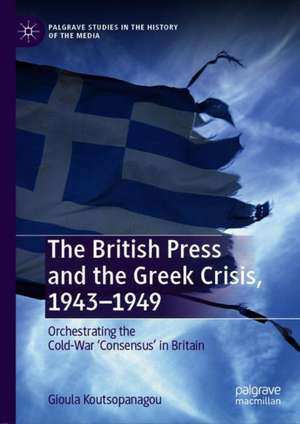The British Press and the Greek Crisis, 1943–1949: Orchestrating the Cold-War ‘Consensus’ in Britain: Palgrave Studies in the History of the Media
Autor Gioula Koutsopanagouen Limba Engleză Hardback – 2 feb 2020
Din seria Palgrave Studies in the History of the Media
- 15%
 Preț: 696.35 lei
Preț: 696.35 lei - 15%
 Preț: 646.11 lei
Preț: 646.11 lei -
 Preț: 211.47 lei
Preț: 211.47 lei -
 Preț: 393.90 lei
Preț: 393.90 lei - 15%
 Preț: 585.26 lei
Preț: 585.26 lei - 15%
 Preț: 584.43 lei
Preț: 584.43 lei - 15%
 Preț: 700.61 lei
Preț: 700.61 lei - 18%
 Preț: 894.03 lei
Preț: 894.03 lei -
 Preț: 384.48 lei
Preț: 384.48 lei - 18%
 Preț: 738.06 lei
Preț: 738.06 lei -
 Preț: 385.84 lei
Preț: 385.84 lei -
 Preț: 391.61 lei
Preț: 391.61 lei -
 Preț: 449.90 lei
Preț: 449.90 lei -
 Preț: 389.70 lei
Preț: 389.70 lei -
 Preț: 385.47 lei
Preț: 385.47 lei - 15%
 Preț: 584.10 lei
Preț: 584.10 lei - 15%
 Preț: 587.72 lei
Preț: 587.72 lei - 18%
 Preț: 895.27 lei
Preț: 895.27 lei - 15%
 Preț: 589.33 lei
Preț: 589.33 lei - 18%
 Preț: 732.84 lei
Preț: 732.84 lei -
 Preț: 391.61 lei
Preț: 391.61 lei -
 Preț: 391.79 lei
Preț: 391.79 lei - 15%
 Preț: 641.53 lei
Preț: 641.53 lei - 15%
 Preț: 531.59 lei
Preț: 531.59 lei - 15%
 Preț: 645.14 lei
Preț: 645.14 lei - 15%
 Preț: 585.08 lei
Preț: 585.08 lei - 15%
 Preț: 640.88 lei
Preț: 640.88 lei - 15%
 Preț: 586.38 lei
Preț: 586.38 lei -
 Preț: 388.72 lei
Preț: 388.72 lei -
 Preț: 381.59 lei
Preț: 381.59 lei -
 Preț: 386.22 lei
Preț: 386.22 lei -
 Preț: 392.21 lei
Preț: 392.21 lei -
 Preț: 395.47 lei
Preț: 395.47 lei -
 Preț: 387.20 lei
Preț: 387.20 lei - 15%
 Preț: 583.93 lei
Preț: 583.93 lei -
 Preț: 485.99 lei
Preț: 485.99 lei - 15%
 Preț: 582.80 lei
Preț: 582.80 lei -
 Preț: 392.60 lei
Preț: 392.60 lei -
 Preț: 391.61 lei
Preț: 391.61 lei - 15%
 Preț: 698.15 lei
Preț: 698.15 lei - 18%
 Preț: 791.57 lei
Preț: 791.57 lei
Preț: 787.91 lei
Preț vechi: 960.87 lei
-18% Nou
Puncte Express: 1182
Preț estimativ în valută:
150.84€ • 157.38$ • 126.44£
150.84€ • 157.38$ • 126.44£
Carte tipărită la comandă
Livrare economică 13-27 martie
Preluare comenzi: 021 569.72.76
Specificații
ISBN-13: 9781137551542
ISBN-10: 1137551542
Pagini: 348
Ilustrații: XII, 375 p. 1 illus.
Dimensiuni: 148 x 210 mm
Greutate: 0.61 kg
Ediția:2020
Editura: Palgrave Macmillan UK
Colecția Palgrave Macmillan
Seria Palgrave Studies in the History of the Media
Locul publicării:London, United Kingdom
ISBN-10: 1137551542
Pagini: 348
Ilustrații: XII, 375 p. 1 illus.
Dimensiuni: 148 x 210 mm
Greutate: 0.61 kg
Ediția:2020
Editura: Palgrave Macmillan UK
Colecția Palgrave Macmillan
Seria Palgrave Studies in the History of the Media
Locul publicării:London, United Kingdom
Cuprins
1. In the Realm of the 'Cultural Cold War'. Registering Media into the History of the Cold War.- 2. Britain During the Prelude to the Cold War: constructing an anti-communist consensus.- 3. A 'War of Worlds': creating a new vocabulary for post-war anti-communism.- 4. The British Press in the Formative Early Cold War Years.- 5. Wartime Censorship and the Early Construction of a Post-war 'Consensus'.- 6. Managing the Press Storm of December 1944.- 7. Keeping British Press reporting within the 'Correct' Bounds.- 8. Pointing at the Communists as the Main Danger to Law and Order in Greece.- 9. Orchestrating Cold-War Public 'Consensus' in the British Press.- 10. Conclusion.
Notă biografică
Gioula Koutsopanagou is founding director of the Media History Workshop (ETMIET) in the Research Centre for Modern Greece at Panteion University, Greece. She is adjunct academic staff of the Faculty of Humanities at Hellenic Open University. She is the co-editor of the Encyclopedia of the Greek Press. Her monograph on British Cultural and Information Publicity Policy in Greece, 1943-1950 will be published in 2019.
Textul de pe ultima copertă
This book provides the first detailed analysis of how interactions between government policy and Fleet Street affected the political coverage of the Greek civil war, one of the first major confrontations of the Cold War. During this period the exponential growth of media influence was an immensely potent weapon of psychological warfare. Throughout the 1940s the press maintained its position as the most powerful medium and its influence remained unchallenged. The documentary record shows that a British media consensus was more fabricated than spontaneous, and the tools of media persuasion and manipulation were extremely important in building acceptance for British foreign policy. Gioula Koutsopanagou examines how this media consensus was influenced and molded by the British government and how Foreign Office channels were key to molding public attitudes to British foreign policy. These channels included system of briefings given by the News Department to the diplomatic correspondents, and the contacts between embassies and the British foreign correspondents.
Caracteristici
Provides the first detailed analysis of how interactions between government policy and Fleet Street affected the political coverage of the Greek civil war. Examines how a media consensus was influenced and molded by the British government and how Foreign Office channels were key to molding public attitudes to British foreign policy. Analyses media channels including the system of briefings given by the News Department to the diplomatic correspondents, and the contacts between embassies and the British foreign correspondents.
